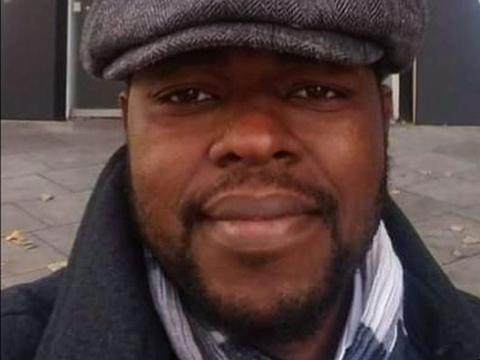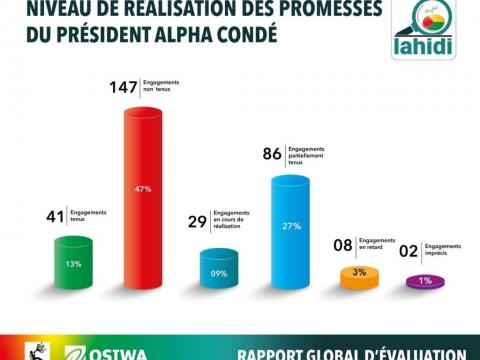A leading Guinean civil society activist talks to Politico
Alhoussein Fadiga is the head of the Association of Guinean Bloggers, known by its French acronym ABLOGUI or l'Association des blogueurs de #Guinée.
ABLOGUI, which has served as a pressure group to the Guinean government since the West African country started its current path of democratic journey in 2010, has been putting elected officials on the limelight, enabling the electorate to hold them to account through promises they make.
Through a project called Lahidi, ABLOGUI tracked the promises made by the Conde administration while campaigning in the 2015 elections. This week, on Monday October 12, it released a major report on the performance of the incumbent president.
Coming on the eve of a crucial election, the report is significant for the country. Fadiga explains this in this interview conducted by Kemo Cham and transcribed by Mabinty M. Kamara.
Politico: You have been tracking Alpha Conde’s promises and recently I saw one of his main contenders, Saillu Dialein Diallo, cited your report. Can you say a little bit about your findings on the president?
Alhoussein Fadiga: Yes. He cited the report yesterday, because we published the global report on Monday. We previously had six reports published and it was supposed to be more than that. We were expecting like 20, but the lack of access to public information was really a problem. So we were only able to do with the ones that were available to talk to us. So that helped us to make the six reports since four years ago, and on Monday we published the final one. It was more than three hundred promises. Some 315 promises, only 14 were delivered.
Overall what does this say about Alpha Conde?
Well, it is not only about Alpha Conde. It is about his government and his political party. With the Guinea vote and the Lahidi promises, we only based our findings on what the political party promised, but because he is the president, obviously, according to what we found, his promises were not kept.
But they will say that they didn’t promise anything. They will say we built schools, we built roads, we built hospitals, but the thing is, we based our work on specifically the document (Manifesto) which they published in 2015, saying that ‘if we are elected, this is what we going to do.’
They did many things outside the manifesto, but we didn’t take that into consideration because they were not documented. We only took into account what we had in hand and what they published in 2015. And according to that, those promises were not kept. But obviously they will say something different.
How important is this finding in the current electoral context?
Well, it is significant for the way of changing politics. As our main objective is not to judge anyone, our objective is to open people’s eyes on politics in Guinea. That was our main objective for especially the youths. As we are used to in Africa, politicians just come, throw t-shirts at people, bags of rice to people, give them money… We wanted to show people the different way of doing politics. It is not about giving money, it is not about t-shirts or giving rice to people, it is about coming and telling what are you going to do to change my life, the life of my family. But in promising those, I want to get involved in it. Just don’t come and tell me, I want you to get me involved so we can do it together. Because obviously, you can’t just do it alone, I have to collaborate with you, we have to do it in partnership. So we want you to come and tell us what you want to do and we tell you what we need and then we work together. So that’s the kind of politics we are yearning for in Guinea. That’s why we put this initiative in place. Politics is about promises, it’s about manifesto, it’s about the government and the people.
I know that Lahidi is a continuous process. You have ben releasing these reports of your findings in piecemeal. This latest report comes just days before the vote. Not many Guineans are going to see this. Do you think Guineans have got the message from your work?
I wouldn’t say all of them got the findings. That was exactly the problem I was getting in the last two days, because for the past four years, we have been publishing reports. We have published six reports before publishing this global one. If only politicians, citizens, everyone have been interested since our first report, I don’t think we would have been talking about too much debates, because even if one Sellu Diallo tweeted our reports and then one of his communication team tweeted it, like the day before, I was kind of angry at them. I was like it’s been four years we have been publishing this reports. If you guys had interest, in it, like you are having it today, I don’t think we would have been here today. It’s not because you will be supporting the government, no, you will be pushing them to work. And because you push them to work, people will see that you are interested in changing their lives as well. It is not that you wait two days after we published the final report and then you guys come and start sharing it. Alpha Conde didn’t do this, he didn’t do that, so in a way, you didn’t let him do the work, because you didn’t participate to our work, the work of citizens.
On a final note, everyone knows that elections in Guinea, just like almost everywhere in Africa, are centered on ethnicity. So what lessons can the people of Guinea lean from what you are trying to do and change the situation?
What I can say to the Guinean people is that on the 18th of October 2020, everyone who has a voters’ card should go out and vote. Go out and vote. That’s the only way you can have a voice and you can make a complaint after, because many people are saying that the opposition parties didn’t play their roles as much as they would have. But when elections come, anything can happen. People can say the incumbent candidate is favorite and so the opposing side had difficulties. Some didn’t want to be involved in the process because of this and that, because of many reasons, but I will say that anyone who has a voters’ card should go out and vote because in an election, anything can happen. No one is a winner until the result is announced. So staying at home, taking things for granted, you will be making your candidate lose a vote.
Everything is done now, it’s all finished. The campaign is over. The campaigns are gone, Sellu diallo at the moment is entering Conakry and it is a sea of people as usual. Not all of them are enrolled (registered to vote) but those who are enrolled in the public should go out on Sunday and vote. And this is the same thing for Alpha Conde as well, when he was entering Conakry. There was a sea of people, but if you take for granted the images you see on social media or on TV and you don’t go out to vote, you make your candidate lose.
So that is my only advice. Everything is all done now. The only thing that people have to do is to go and put that polling card into the ballot box and then you go home and sit and wait for the result.
Copyright © 2020 Politico Online









